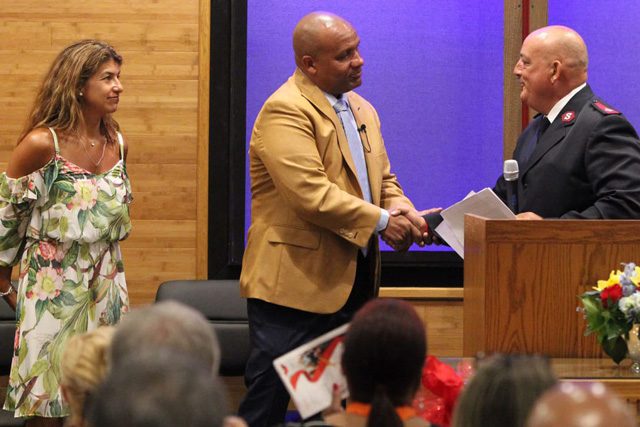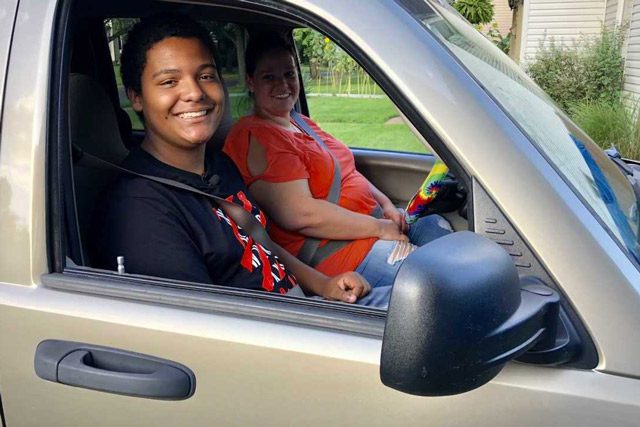Listen to this article
Listen to this article
Loading
Play
Pause
Options
0:00
-:--
1x
Playback Speed- 0.5
- 0.6
- 0.7
- 0.8
- 0.9
- 1
- 1.1
- 1.2
- 1.3
- 1.5
- 2
Audio Language
- English
- French
- German
- Italian
- Spanish
Open text
new anti-trafficking initiative launched in nebraska. a $1.5 million grant from the dept. of justice will fund a centralized, 24/7 intake service. the salvation army in nebraska launched its new referral service last month to assist survivors of human trafficking across the state. the initiative is funded by a grant from the u.s. department of justice, which the salvation army won last october. the $1.5 million award, to be doled out over three years and shared with the nebraska attorney general’s office, is renewable. the army began staffing the initiative in march, and has since reached out to some 160 agencies across the state to begin thinking about ways to collaborate. in 2015, nebraska was given a c grade for its anti-trafficking efforts by the nonprofit shared hope. overall, the state lacks an infrastructure for assisting survivors, a failure highlighted at a hearing at the state capital last october. in several cases, that meant victims of sex trafficking ended up right back with their abusers, one official testified. this grant is designed to address that by supporting efforts to pool resources through a statewide task force. the salvation army will play a lead role in the initiative, overseeing a centralized, 24/7 intake service. at the same time, several organizations are working to bring new resources online. for instance, there are presently no shelters available to trafficking victims, so two local agencies are now looking into building housing, according to alicia webber, who leads safe-t, the salvation army fights to end trafficking in nebraska. “depending on what is needed and where the survivor is located, the army will act as a case manager or case coordinator,” webber said. hard numbers are difficult to come by, but as a state with a substantial agriculture industry, manufacturing sector and a designation as a refugee destination—workers on visas are particularly vulnerable to exploitation—nebraska is likely the site of significant labor trafficking, officials say. some work has already been done to document the extent of its sex trafficking problem. recently, researchers at omaha-based creighton university estimated around 45 nebraskans a day could be found for sale on backpage.com, many of whom were minors, and many showed signs of ties to national trafficking operations. this latest effort will build on the salvation army’s substantial efforts to combat human trafficking around the world. “we’re really fortunate to have the salvation army behind us,” webber said. “we’re not reinventing the wheel. we can get ideas on what’s worked elsewhere.”.
Open context player
Close context player
Plays:-Audio plays count
new anti-trafficking initiative launched in nebraska. a $1.5 million grant from the dept. of justice will fund a centralized, 24/7 intake service. the salvation army in nebraska launched its new referral service last month to assist survivors of human trafficking across the state. the initiative is funded by a grant from the u.s. department of justice, which the salvation army won last october. the $1.5 million award, to be doled out over three years and shared with the nebraska attorney general’s office, is renewable. the army began staffing the initiative in march, and has since reached out to some 160 agencies across the state to begin thinking about ways to collaborate. in 2015, nebraska was given a c grade for its anti-trafficking efforts by the nonprofit shared hope. overall, the state lacks an infrastructure for assisting survivors, a failure highlighted at a hearing at the state capital last october. in several cases, that meant victims of sex trafficking ended up right back with their abusers, one official testified. this grant is designed to address that by supporting efforts to pool resources through a statewide task force. the salvation army will play a lead role in the initiative, overseeing a centralized, 24/7 intake service. at the same time, several organizations are working to bring new resources online. for instance, there are presently no shelters available to trafficking victims, so two local agencies are now looking into building housing, according to alicia webber, who leads safe-t, the salvation army fights to end trafficking in nebraska. “depending on what is needed and where the survivor is located, the army will act as a case manager or case coordinator,” webber said. hard numbers are difficult to come by, but as a state with a substantial agriculture industry, manufacturing sector and a designation as a refugee destination—workers on visas are particularly vulnerable to exploitation—nebraska is likely the site of significant labor trafficking, officials say. some work has already been done to document the extent of its sex trafficking problem. recently, researchers at omaha-based creighton university estimated around 45 nebraskans a day could be found for sale on backpage.com, many of whom were minors, and many showed signs of ties to national trafficking operations. this latest effort will build on the salvation army’s substantial efforts to combat human trafficking around the world. “we’re really fortunate to have the salvation army behind us,” webber said. “we’re not reinventing the wheel. we can get ideas on what’s worked elsewhere.”.
Listen to this article














